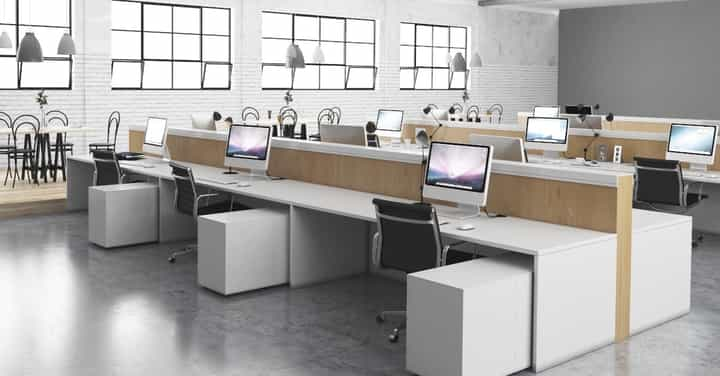At AskCody, we frequently discuss modern workplaces and stay up to date with the latest office trends. We analyze these trends to determine what works, what doesn't, and what changes are necessary to make them effective.
In recent years, there have been many shifts in corporate culture, including the disappearance of cubicle farms and the rise of working from home. However, what may work for one company or department may not work for others.It's important to respond intelligently and thoughtfully to the flexibility that today's workforce desires, without sacrificing privacy or creating chaos with open spaces and a lack of available resources. This is where the concept of office hoteling comes into play.
Hoteling - manage your office desks and resources effectively
Some companies make the switch of how they manage their office space purely for financial reasons. The physical office can be one of the most costly parts of doing business. For many, switching from dedicated offices to a space that utilizes shared resources is a no-brainer. Research has shown that up to 50 percent of desks sit unused on any given day at a traditional office. That’s a tremendous waste of real estate coin.
Office structures that emphasize flexibility recognize that much of today’s workforce is only occasionally in the office. They are on the road, working remotely, or part of the growing field of freelancers and contract workers who don’t need a permanent workstation.
In addition to companies cashing in on the capitalization of square footage and resource utilization, workers who have a variety of spaces at their disposal have reported feeling more productive, more creative, and more appreciated.
Many experts theorize that a flexible office environment with open spaces and shared resources promotes collaboration, communication, and more creative thinking.

Workplace hoteling - flexibility, not frustration
Creating an office environment that is an alternative to the traditional office space must be managed carefully. Without the proper systems in place, your newly designed shared office space could quickly devolve into your newest headache.
On days that happen to have high occupancy, desks can seem to disappear quickly. Some spaces might be more popular than others, such as those that provide hookups to large screen monitors or desks in prime locations away from the scrum of things.
You must also consider visitors. Those consultants, contractors, and colleagues traveling from another site all need to find a place to work in an already unfamiliar environment.
No one wants to start their day with an aggravating search for a place to work.
As a result, companies are adopting a trend known as office hoteling, in which workers schedule their use of workspaces. This eliminates the first-come-first-serve mentality of claiming a desk for the day without sacrificing the flexibility that employees have come to expect. Musical chairs was fun at your sixth birthday party. It’s not fun in the office.
Office hoteling is an increasingly popular style of office management for industries such as law, who often have attorneys traveling between offices. When every minute is a potentially billable minute, time wasted searching for a desk is quantifiable costly.
The most important reservation features for your office hoteling experience
Implementing an office hoteling method for office management won't work without the right system to fit your needs. If you are newly considering an office hoteling process, you might not even know what all of those needs are. It's important to assess your office's specific requirements and objectives before selecting a system that can effectively support your office hoteling strategy.
By carefully considering the relevant factors and selecting the right system, you can ensure a smooth transition to an office hoteling style of office management. The chosen system should effectively meet your office's needs, enhance productivity, and provide the flexibility and efficiency that today's modern workforce desires.
The following is a checklist of features that will ensure your transition to an office hoteling style of office management is smooth and beneficial for employees, freelancers, and visitors alike.
1. Resource booking
Obviously, any type of office hoteling experience is going to rest on the back of a resource booking system that allows users to easily search for and book hot desks, huddle rooms, and other office resources. The right system will help you plan ahead, enabling users to book resources across locations so a worker in one office can book her desk at another office location before she even gets there.
Your office hoteling booking platform should be seamlessly integrated with Outlook, Microsoft 365, or whatever other calendar platform keeps your office running. Users should be able to access it from their desktop or mobile devices so they can book from home, on the way into the office, or as they walk through the hallways.

2. Automated check-in
When it comes to welcoming visitors to your office, efficiency and convenience should be top priorities. With an automated check-in tool integrated into your resource booking systems, you can eliminate the hassle of visitors wasting time at the front desk. This tool provides a fast and intuitive touch screen experience, allowing visitors to breeze right through the check-in process.
Not only does this automated check-in tool save time, but it also enhances the overall visitor experience. From the system, visitors can easily print their name tags, access maps and directions to their designated areas, and find important office information such as the Wi-Fi password or any customized notes they may need. This ensures that visitors have all the necessary information at their fingertips, enabling them to navigate the office seamlessly.
In addition to streamlining the check-in process, security is a critical consideration when implementing an office resource booking system. It is essential to choose a system that adheres to tightly locked GDPR data management standards. This ensures that sensitive visitor information is protected and handled in compliance with privacy regulations. By prioritizing security, you can provide peace of mind to both your office guests and your organization.
By incorporating an automated check-in tool into your resource booking systems, you create a seamless and efficient process for visitors. Not only does this enhance the overall experience for your guests, but it also reflects positively on your organization's commitment to providing a modern and technologically advanced workplace.

3. Digital display screens
Maximize your office’s utilization with digital check-in screens attached to each hot desk and outside each meeting room. Fully integrated and synchronized digital meeting room signs let everyone who passes by know if a room is occupied, by whom, for what purpose, and for how long. Users can snag an open room or desk on the fly.
Digital room displays enhance utilization, so you know you truly are making the most of your shared resources. If no one has checked into a booked resource within a set window, the system will automatically open it up for other users so desks and rooms never sit empty while others are searching for a place to work. If someone finishes early, one tap to the digital display will release the room. Conversely, if a worker needs more time, they can view any upcoming bookings and add time if it is available.
A robust display tool will even have a built-in fault reporting feature so if something at that workstation isn’t working, users can report it with a few taps of the screen. The system will automatically instantly report the issue to the right person so no one has to go searching for help.
A flexible office fit for a flexible workforce
With the right system in place, like AskCody’s complete Workplace solution, the only thing your office hoteling experience will be missing is room service. Oh wait, technically we have that covered too. Our complete Workplace solution not only offers seamless resource booking, automated check-in tools, and digital display screens, but it also provides added amenities to enhance the office hoteling experience.
When thoughtfully executed, office hoteling offers the level of flexibility today’s modern workers crave without the frustration of an inefficient search for resources. With AskCody’s complete Workplace solution, not only can you streamline your office management and maximize resource utilization, but you can also create a work environment that prioritizes employee satisfaction and well-being. From 'room service' to additional services, our solution is designed to enhance productivity, foster collaboration, and ensure that your office hoteling experience is truly exceptional.
Conclusion - Optimize your hoteling to free up desk and office resources
Office hoteling is becoming an increasingly popular trend in office management, offering flexibility and cost-saving benefits for companies. By implementing a resource booking system, automated check-in tools, and digital display screens, companies can create a flexible office environment that maximizes resource utilization and enhances productivity.
However, it is crucial to choose the right system that seamlessly integrates with existing office platforms and ensures a smooth transition for employees, freelancers, and visitors. With the right system in place, office hoteling can provide the level of flexibility and efficiency that today's modern workforce desires.
To learn more about how AskCody's solution can help you implement office hoteling effectively, download our E-Book and explore the benefits we offer.




